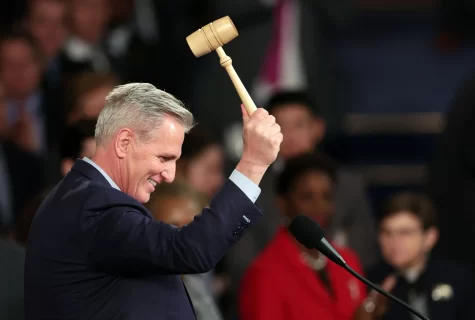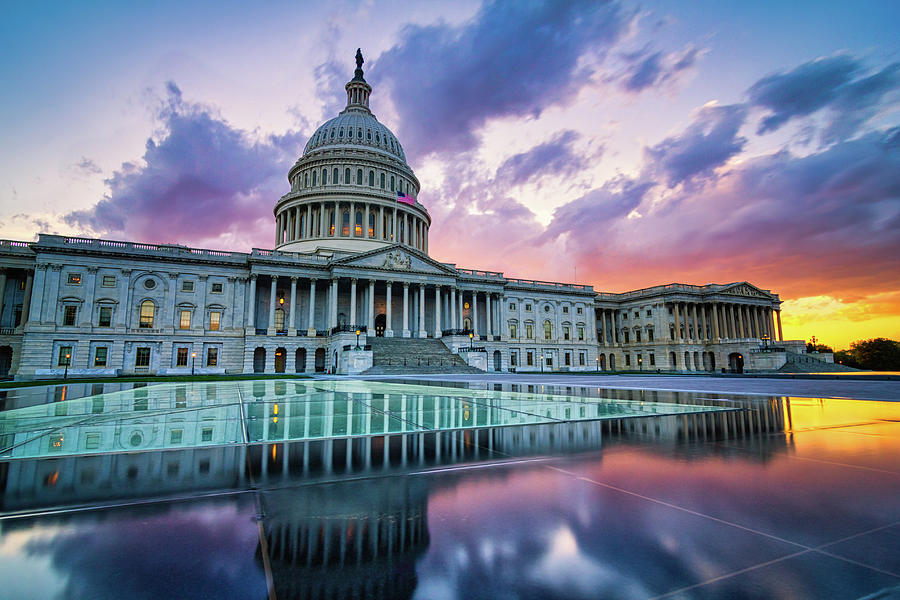The House of Representatives Can Finally Begin Governing – So Why Couldn’t They Before?
A divide in the Republican Party became clear during a historic and unprecedented Speaker vote.
January 23, 2023
The 118th Congress was supposed to be sworn into office on January 3, 2023, after the midterm elections on November 8, 2022. The Senate was sworn in on the intended date, but the same can’t be said for the House of Representatives.
As of the early morning hours of January 7, the House is operational. This wasn’t possible on the planned date because the House members had yet to agree on a presiding officer for the legislative body, a position known as Speaker of the House.
Currently, the Republicans hold the majority in the House, with 222 members compared to the Democrats’ 213. Since the required number of votes for a Representative to become Speaker is 218, it should have been easy for the Republicans to place one of their members in the position. The problem is, Republicans couldn’t agree on whom they wanted to take the position.
Throughout the 15 Speaker votes conducted by the House from January 3 to January 6, a majority of Republicans backed Kevin McCarthy, a congressman from California who has been the leader of the House Republicans since 2014. McCarthy played a key role in helping Republicans win their majority in the House and had been hoping that would give him the support of all members of his party. Of course, it wasn’t that simple.

During the first three days, there was an average of 20 House Republicans who refused to vote for McCarthy. A majority of these holdouts came from the Freedom Caucus, a group that many Democrats and Republicans consider to hold the most far-right members of the Republican Party. Over the course of the eleven votes held on these three days, the group proposed a number of candidates for Speaker, including Jim Jordan (OH), Andy Biggs (AZ), Jim Banks (IN), Byron Donalds (FL), Kevin Hern (OK), and even Lee Zeldin, a now-retired Representative from New York, and former President Donald Trump. None of these candidates managed to gain a significant amount of support, although they did keep McCarthy’s hopes of gaining the Speakership out of sight.
On January 7, the fourth day of voting, there finally seemed to be an end nearing for the voting marathon when, during the twelfth vote, McCarthy managed to gain the support of 14 Republicans who had previously been holding out on him. He carried this momentum into the thirteenth vote when he picked up the support of another holdout from his party, Andy Harris (MD), and then into the fourteenth vote when he gained the votes of Ken Buck (CO) and Wesley Hunt (TX).
After this vote, it seemed that the Republicans were ready to adjourn until the following Monday, January 9, but after Marjorie Taylor Greene (GA), a firm supporter of McCarthy despite being on the Freedom Caucus, had some of the holdouts talk to former President Donald Trump, a score of Republicans rushed to change their votes from supporting the House’s adjournment to opposing it, including McCarthy.
Soon enough, the House of Representatives entered its fifteenth Speaker vote, and all remaining holdouts from the Republican Party who had previously supported other candidates, including Matt Gaetz (FL), a key vote for McCarthy, switched their votes to “present”, allowing the threshold McCarthy had to reach to lower enough to have the 216 members voting in favor of McCarthy to be enough for him to finally win.
Throughout all fifteen votes, all Democrats stood firmly behind their candidate for Speaker, House Democratic Caucus leader Hakeem Jefferies (NY).
In order to gain the support of far-right members, McCarthy had to make numerous concessions, including giving them seats on key committees and allowing any member to call for a vacation of the Speaker’s chair (essentially meaning that any one member of the House can bring up a motion for McCarthy to be ousted as Speaker without the backing of other Representatives). While this pleased the conservatives, moderates were either concerned that this would weaken McCarthy’s position as Speaker and diminish their ability to govern as a majority or irritated that McCarthy was giving concessions to those who hadn’t supported him, rather than those who had.
A contest for Speaker hasn’t lasted this long since 1859, when it took 44 votes for a Speaker to finally be selected. Of course, neither of these numbers come close to the longest-running Speaker vote, which began in December 1855 and, after 133 votes, concluded in February 1856.
Now that the House can finally begin governing, people all over the country are looking forward to their Representatives getting to the work that they were elected to do; working on legislation that benefits, well, the people. To many, that’s much more important than politicians fighting over their different viewpoints.
